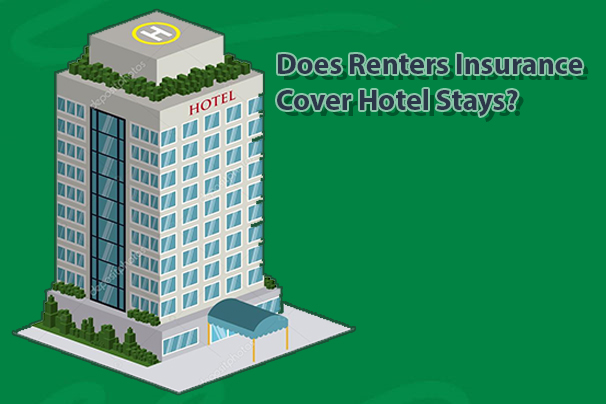Yes, your renters insurance will mostly cover everything, including any hotel stays if there is damage to your rental property. If a covered risk renders your apartment uninhabitable, you don’t go over your policy limits, and you file your claim in good faith, you will only be compensated by loss of use coverage.

Your insurance policy covers hotel or motel expenses, personal property repairs, liability claims, and moving-related expenses like food, storage, and pet boarding. Furthermore, ensure your renter’s insurance policy aligns with your lifestyle and can cover all your belongings, and regularly review it to ensure you understand the covered risks.
When Does Renters Insurance Cover Hotel Stays?
When your current rent is not enough to cover the expense of hotel stays, your renters insurance coverage may frequently help. However, that depends on the cause of your rental home’s termination. Loss-of-use coverage, a feature of renters insurance that helps with costs if you are unable to occupy your rental, is necessary with renters insurance.
This is referred to as supplementary living expenses coverage or relocation expenses coverage by certain insurers. Moreover, many renters insurance policies will cover any costs you incur while your home is uninhabitable, which might include hotel stays.
If the incidence qualifies as a covered risk, your renters insurance will only pay out or compensate loss of usage. The majority of standard renters insurance policies include the following as insured perils:
- Lightning and fire
- Hail and windstorms
- Detonations
- Upheavals
- Fire
- Theft
- Vandalism
- Damage resulting from water- or steam-heating systems or appliances
- Water or steam leakage or overflow
- Air conditioning, heating, and plumbing freezing
Loss-of-use coverage only covers short-term living expenses following a covered risk, not other living arrangements if damage is not caused by a covered occurrence. If you are unsure about which hazards get coverage, see your insurance agent.
When Does Renters Insurance Not Cover Hotel Stays?
There are several reasons why your renters insurance policy can deny you access to your loss-of-use benefits. The primary reason your extra living expenses would not be reimbursed by your renters insurance is that the hazard is not covered. Certain situations could qualify as annoying, but they won’t render your house officially uninhabitable, including:
- Your air conditioner malfunctions.
- There’s a problem with your hot water.
- Problems with gas and stoves
- Outages of energy or power
- Natural catastrophe damage
In some cases, your provider may refuse to grant you loss-of-use coverage even if the risk gets coverage by your policy.
The cost exceeds the maximum amount
Your renters insurance will only refund you for the amount covered by your policy, not the full cost of your stay. If you just bought a little quantity of loss-of-use coverage, this may occur.
You make a fake claim
Your renters insurance will not cover any damages or loss of use if you lie about the damage to your home. Your renters insurance will also view this as a fraudulent claim and won’t compensate you if you intentionally caused the damage.
How Long Will Renters Insurance Cover Hotel Stays
Your coverage and the extent of the damage to your rental property will determine how long your renters insurance will cover hotel stays. However, the majority of insurance providers will pay you back for the least period of time you have to be away from your house. That implies that you cease making payments as soon as your home is once again livable.
Additionally, extra costs you incur while temporarily away from your house may also be covered by your renters insurance policy’s loss-of-use coverage. For instance, the cost of gas has increased from $75 per week to $100 per week due to the increase in distance from one’s workplace. Depending on your policy, your renters insurance may cover the additional $25 per week.
The following extra costs may also be covered by your renters insurance, depending on your policy:
- Dinners at restaurants (fairly priced).
- Costs of storage units.
- Pet lodging.
- Laundry cost.
While you are temporarily gone from your home, you should save all of your receipts so you have documentation of the expenses associated with your time away. While your renters insurance will often cover basic requirements, it will not cover luxury expenditures.
How To Avoid Extended Hotel Stays
Your renters insurance can cover your hotel stays and other living expenses, but only up to the amount of your policy limit. Therefore, it is wise to plan for certain preventive actions to reduce the chance of significant damages rendering your property unusable.
Keep a backup generator on hand
This will guarantee that all of your house’s necessary systems are operational and up to date, saving you from having to move temporarily. Get your landlord’s approval before installing a backup generator, though.
Ask your landlord to make your house safer from hazards
While you are unable to prevent abrupt or unforeseen damage or repairs, you may urge your landlord to fortify your house against potential threats to the safety of your neighborhood. This will lessen the need for costly repairs or damage to your house.
Avoid mold and water damage
Water damage and mold might be more serious than you would imagine. Ascertain that your plumbing systems are functioning properly, and periodically inspect your house for any indications of mold. This includes a foul stench, warped walls, stains on clothing, chipped paint, etc.
Moreover, while renters insurance can cover hotel stays, having enough coverage is necessary to receive comprehensive protection. Therefore, determine from your provider how much loss-of-use coverage you need to safeguard your supplemental costs, and take appropriate action.
How To File Claim For Hotel Stays
Most of the time, you would have to cover your hotel stays out of pocket at first, and then you would have to file a claim to get your insurance company to reimburse you. This is the standard procedure for the majority of insurance claims, including loss of use claims.
Additionally, your insurance company will often evaluate and accept your claim after you submit it before paying you back. To ensure your additional temporary living expenses are within your policy’s limits and caused by insured risk, they may request receipts and a detailed explanation. Furthermore, insurance companies can offer cash up front to aid with urgent expenses, particularly in the event of major disasters.





